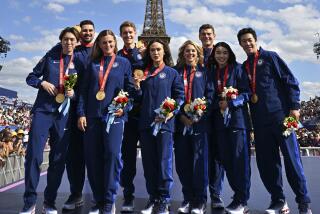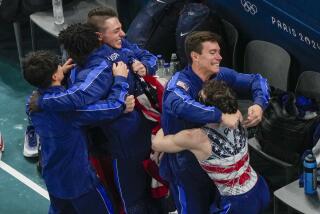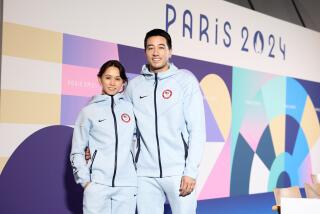WINTER OLYMPICS : Soviets 1-2 Again in Pairs Skate : U.S. Gets First Medal With 3rd-Place Finish
CALGARY, Canada â As was proved once again Tuesday night in the Winter Olympics figure skating competition at the Saddledome, the Soviet Unionâs Ekaterina Gordeeva and Sergei Grinkov have no peers in pairs.
The two-time world champions were first according to all nine judges in the 4 1/2-minute long program, receiving six 5.9s on a six-point scale for technical merit and eight 5.9s for artistic impression.
They were challenged by none of the other pairs, not even by the defending Olympic champions, the Soviet Unionâs Elena Valova and Oleg Vasiliev, who finished second with no scores higher than 5.8. They also finished second to Gordeeva and Grinkov at the 1986 and 1987 world championships.
Together, the two pairs continued the Soviet Unionâs domination of the medals in Olympic pairs skating. Soviet pairs have won every gold medal since 1964, and this was the fourth time since 1968 that Soviet pairs have finished first and second. The third Soviet pair, Larisa Selezneva and Oleg Makarov, finished fourth.
A Soviet medal sweep was prevented by three-time U.S. national champions Jill Watson of Bloomington, Ind. and Peter Oppegard of Knoxville, Tenn., who finished third and gave the United States its first medal of the Games. Gillian Wachsman of Greenwich, Conn. and Todd Waggoner of Schaumberg, Ill. finished fifth, giving the United States two pairs among the top five for the first time ever. The third American pair, Natalie and Wayne Seybold of Marion, Ind., finished 10th.
It was the second straight time in the Olympics that pairs skaters have been the first U.S. medalists. The brother and sister pair of Kitty and Peter Carruthers finished second to Valova and Vasiliev four years ago in Sarajevo, Yugoslavia.
That began a parade of U.S. athletes to the victory stand as the Americans finished with four gold medals and eight overall. But this one may be a relatively isolated incident. Not until the final day of the menâs figure skating competition Saturday is the United States expected to win another medal.
Watson, 24, and Oppegard, 28, came through despite being distracted when a Saddledome usher went onto the ice during their long program to retrieve a camera bag that was dropped by a photographer.
âI felt like we were in the Ice Capades doing a serious number, and there was a comedy routine going on around us,â Oppegard said.
According to the rules, they could have stopped their program and either started over or begun again from the point when they were interrupted.
âIt took my concentration away momentarily because I wanted to see what he was doing,â Oppegard said. âHe was out there for a long time. I would have preferred for him to leave the camera bag out there. I thought about what it would do to us to stop the program. But it only made us concentrate that much harder.â
Performing a death spiral at the time, Watson and Oppegard were fortunate they did not become casualties.
âWe were so close to being medalists,â Watson said. âWe didnât want to give it up. We just had to dig deeper.â
It was a night of glitches as only Gordeeva, 16, and Grinkov, 21, skated a clean program. Valova and Vasiliev were unable to challenge for their second gold medal after Vasiliev slipped on a landing. Watson and Oppegard had little chance to move into second after she fell on a side-by-side double axel. Selezneva also fell.
âI think a lot of people are trying to do things they canât do,â Natalie Seybold said. âPeople are putting too much emphasis on the throws. Thatâs where all the mistakes are.â
Her brother, Wayne, agreed.
âPeople over the last four years have become very trick oriented,â he said. âWith Gordeeva and Grinkov, you see both the artistic and the tricks. But the other pairs need to concentrate more on the artistic and less on the tricks.â
Other pairs skaters are reacting to Gordeeva and Grinkov, who ushered in the new era two years ago, when they finished with the gold medal in their first senior world championship. Only 14 at the time, she was 4-11 and 77 pounds, which enabled the larger Grinkov to toss her like a feather pillow. Their signature move was a quadruple twist. He threw her into the air, where she rotated four times before landing in his arms.
Now that she has grown to a whopping 5-1, 90 pounds, Grinkov, 6-0, 175, has more difficulty tossing and catching her. Their quadruple twist has become a triple. But they might be better skaters because of it, having been forced to concentrate more on their presentation. They skated Tuesday night to music from Chopin and Mendelssohn.
âWhat I saw tonight was a little more classical approach, more artistic,â said Kerry Leitch, coach of the Canadian figure skating team. âOn the whole, theyâre better than they were a year ago. They have a very good rapport between them, which is unusual for Soviets.â
They have left behind the more traditional pairs, such as Valova, 25, and Vasiliev, 28, who cannot compete with the younger Soviet pairâs athletic skills.
Watson and Oppegard are more similar to Gordeeva and Grinkov. She is 5-0, 94 pounds. He is 6-0, 175. They might also have passed the defending champions if Watson had not fallen early in the program on side-by-side double axel. They skated to music from Madame Butterfly.
âI was very surprised,â Waston said. âThat happens to be a very consistent move for me. I thought I landed it, and, all of a sudden, I was down, I just told myself, âIf youâre going to win the medal, youâre going to have to do the rest of these things.â I let my body take over, and we did them.â
There was room in the scores for Wachsman and Waggoner, skating last, to improve over their fourth-place finish in the short program and beat Oppegard and Watson for the bronze medal. But after skating brilliantly last week in practice, Wachsman, 21, and Waggoner, 22, were flat.
âBeing in fourth place and having a chance for a medal, that put a little extra pressure on us,â Waggoner said.
But no one can surpass Gordeeva and Grinkov.
âTo tell the truth, they are skating against themselves,â said their coach, Stanislav Leonovich.
Asked what they can do to improve, Gordeeva replied before her coach had a chance.
âFirst of all,â she said, âthatâs a secret.â
More to Read
Go beyond the scoreboard
Get the latest on L.A.'s teams in the daily Sports Report newsletter.
You may occasionally receive promotional content from the Los Angeles Times.






